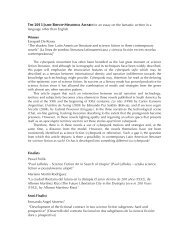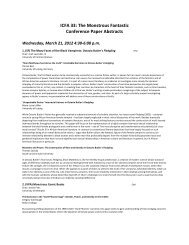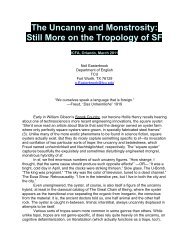University of British ColumbiaChina Miéville’s work belongs [and I hope will be found] in virtually every Division of this conference. His ‘monstrous’ amalgam of genres isexemplary for the floating category of the New Weird [a critic’s convenience, which I believe the writer has abjured]. Assorted science fictionand fantasy modes, including horror, the grotesque, and Gothic, can be seen in his works heading towards the widest ‘crossover’ of all: into,merely, mainstream literature. Mieville’s Un Lun Dun, <strong>The</strong> City and the City, and Kraken, can be explored in contexts ranging from Poe throughLovecraft and Peter Ackroyd to Neil Gaiman. Lewis Carroll’s Alice, Philip Pullman’s His Dark Materials, and many other writers of fiction foryoung readers of any age, set the stage for Un Lun Dun [2007] and Neil Gaiman’s Neverwhere [1996]. <strong>The</strong>se two books share an ‘underground’London, the surface London’s opposite, or ‘double,’ its ‘un’ - doing, or its ‘Un-dun.’ Add nasty pairs of villains, marked by a sardonic, sadistic,very ‘black’ sense of humour, amid surreal disorientations flirting with the occult, and Mervyn Peake is close at hand. <strong>The</strong> City and the City isdifferent again, being the most tightly structured and elegant amalgam in Miéville’s work to date, thanks to the constraints of its ‘political’police procedural, combined -- two genres occupying the same space -- with a fine pier of ontological science fiction, the ‘thought experiment’of two cities in the same space. <strong>The</strong> detective’s ‘pursuit’ of himself owes much to Poe, and to the ‘temporal’ [rather than, as in Un Lun Dun,‘spatial’] division of ‘London’ into two congruent cities, found in Peter Ackroyd’s Hawksmoor [1985]. Kraken blends a dystopia en route toapocalypse with Lovecraftian occult horror, grotesqueries à la Peake, a full serving of Londonian psychogeography, and some Pythonesqueknockabout farce, bringing in its own kind of horror. New? And Weird? Yes, indeed. "New Weird"? Maybe.<strong>The</strong> <strong>Monstrous</strong> Sublime in China Miéville’s Perdido Street StationHoward CanaanMercy CollegeAs perhaps his most elaborately detailed and imaginatively conceived novel, Perdido Station provides an insight into how China Mieville usesthe mix of alien life forms, mutations metamorphoses of bodily forms, and moldings of the human and the artificial to merge the monstrouswith the sublime. After tracing the roots of Mieville’s dystopian vision in the urban landscapes of other science fiction, I will turn to PerdidoStation as a canvas on which to explore the complex relationship between the monstrous and the sublime in the novel. Melville evokes shadesof different responses to the assortedly non-human entities that appear in the novel. This variety of responses adds to the richness andcomplexity of characterization in the novel and Mieville’s evocation of alien consciousnesses presents his vision of the sublime. Likes the vastlandscapes of Piranesi or other Romantic painters that often dwarf the human figures in them, Mieville’s construction of a world inhabited byso many alien – and often terrifying forms – minimizes the human figure and evoke the Romantic sublime. Finally, I will examine the howMieville’s mix of alien forms in a world of urban decay, besides evoking the sublime, reflects on his own role as artist and creator of his world.<strong>The</strong> romance between Isaac and Lin, the scientist-magician and the artist is a romance between the human and the alien that lies at the core ofthe novel. <strong>The</strong> Weavers, the ultimate aesthetes and perhaps the ultimate alien entity in the novel, like Lin, form an alliance with Isaac, theprotagonist and are transpositions or reflections of Mieville as artist... <strong>The</strong> key role that the Weavers play in the resolution of the plot, and theWeavers’ sublimely alienated consciousness drive home the sublimity of the monstrous in the novel.<strong>The</strong> Etched City and Kraken: <strong>The</strong> <strong>Monstrous</strong> Dreamland in Bishop and MiévilleHeather OsborneUniversity of CalgaryEarly in K.J. Bishop’s <strong>The</strong> Etched City, the bounty hunter Gwynn discovers that “as time could ripen, so it visibly could rot, and a prolongedmoment deteriorate badly” (148). Gwynn’s experience is no metaphor, but the substance of life in the city of Ashamoil. Kraken, China Miéville’sexploration of a magical London superimposed on the ordinary city, similarly destabilizes time as the approaching apocalypse consumes allmagical and spiritual energy. In these texts, causality disintegrates as the protagonists descend deeper into their cities’ dreamscapes. As realityfractures, the monstrous substratum of these fantastical worlds begins to overcome the thin surface of reality. In Ashamoil, bodies aredisrupted and rotted from within by dreams and fantastical growths. ‘Knackery’ tears down the veils between magical London and its quotidiancounterpart as the apocalypse builds in Kraken. <strong>The</strong> new life that arises in both novels dissolves the boundaries of the real, proving that it ismore illusory than the magical. As magic intersects with religious cults, technological levels, and scientific ages, the barriers between themerode as a symbol of the deterioration of the real. My paper will examine the surreal movement in <strong>The</strong> Etched City and Kraken from the falsereal to the monstrous dreamland. Magic in each universe draws its power from the immanent spirituality of the people in the world, and thispower is indelibly marked on and through the body. Both Evil and Good are given physical expression, yet morality in these texts is ambivalent,and the embodiment of spirituality is depicted as macabre. <strong>The</strong>se novels enter into Bakhtin’s grotesque realism, in which spirituality manifestsas powerful body-horror. In my paper, I will show how Bishop and Miéville meld the monstrous with the spiritual just as Bakhtin entwinesdegradation with renewal in his dissection of the grotesque.*******Saturday March 24, 2012 2:00-3:30 p.m.126. (SF) Science Fiction Monsters PineChair: Sherryl VintBrock UniversityMonster Horses From Outer SpaceJennifer Cox
Florida Atlantic UniversitySheri S. Tepper’s novel, Grass—named for the planet where the story unfolds—evokes images of verdant beauty, and implies a connection tonature – but on this secluded world, there’s not much “nurture” in Mother Nature. Grass subverts conventional human relationships withanimals, others, power, class, family, religion, and even knowledge: it is a nightmarish imagining of a planet full of Nature’s own worstecological psychopaths, while humanity’s overcrowded home planet is governed by a militant non-denominational religious regime calledSanctity – like Presbyterians hiding the Death Star behind their backs, with their fingers crossed. This ersatz telling of the mythological WildHunt—which inverts human and nonhuman roles—focuses on violent relations of power and communication, and privileges embodiedcommunication over mere words. Human words conceal and deceive; embodied communication, including the science of zoosemiotics, revealsthe truth within messages. In order for humanity to survive, let alone move forward, we must learn to accept and value feedback from interspecialcollaborations. <strong>The</strong> text balances pastiche and parody, but also contains elements of traditional sf, horror, and mystery within multiplestory lines.Of Zombies and Language; or, <strong>The</strong> Shambling SignifiedAndrew FergusonUniversity of VirginiaToday there is hardly a single academic field unmenaced by zombies. <strong>The</strong>se ravenous corpses—in particular, the type created by GeorgeRomero in Night of the Living Dead—have escaped their original confines on the silver screen and infected nearly every medium and area ofinquiry. In the wake of this plague, a cottage industry has sprung up, providing innumerable less-than-convincing answers to the question, Whatdoes the zombie signify? My paper focuses instead on the zombie as an embodiment of failed signification, the "lack" at the heart of languagethat has been hunting Enlightenment rationality since Kant’s momentous critiques. Drawing on a range of zombie literature from SethGrahame-Smith’s Pride and Prejudice and Zombies all the way back to Daniel Defoe’s A Journal of the Plague Year (as well as a variety ofpopular media), and grounding my presentation theoretically in Bruno Latour's compositionism and N. Katharine Hayles's literary complexsystemsdynamics, I develop a model of the zombie as data degradation, as the ultimate victory of randomness over the chaotic patterning ofinformation. I conclude by considering the task of the critic in a mental topography where signifiers float and flicker, but the signifieds shambleever onward to oblivion.Dust and Guts: Matter and Affect in Mark Z. Danielewski's House of LeavesJesse StommelMarylhurst UniversityRebekah SheldonUniversity of Wisconsin-MilwaukeeRecent turns to queer theory and postcolonial theory, alongside longstanding feminist and Marxist approaches, have moved science fictionstudies beyond the taxonomic vocation of genre criticism. Yet while these culturally- and theoretically-inflected schools of thought have beenenormously productive, they have underplayed two important considerations: the form or body of the genre and the effect of that form on itsaudience. <strong>The</strong> same, however, cannot be said of horror studies. Whether through the lens of psychoanalysis or film theory, horror criticism hastaken the question of formal affect as its central critical exigency. At the same time, affect theory has become a pervasive school of thought inits own right informing philosophy, aesthetics, art criticism, and literary theory. As any reader or audience member already knows, horror andscience fiction are monsters of affect, producing experiences whose predictability suggests some non-arbitrary relationship between the formsof the genres and the feelings they produce. In this co-authored presentation, we contend that science fiction and horror not only produceemotional experiences, they are forms of affect theory avant-la-lettre. Our work is not about what these genres are, but rather what they do,their instrumental value both as texts and as theories of texts. Through a reading of Mark Z. Danielewski’s House of Leaves, an ambiguoushorror/sf hybrid, we attempt to generate a critical lexicon that might allow us to discuss how form elicits feeling. In short, this presentationtakes science fiction and horror as privileged instances in which to ask after the causalities of representation. Such a broad and fundamentalsubject in a paper dedicated to paraliterary genres may seem like overreaching, but we insist that it is exactly in formulaic genres that thequestion of form might be most profitably interrogated.127. (SF) <strong>Monstrous</strong> Imaginings in Early Science Fiction OakChair: Lisa SwanstromFlorida Atlantic UniversityFrankenstein, Sirius, and <strong>The</strong> Queer Family of ManJohn RiederUniversity of Hawaii at ManoaWhat is it about Frankenstein that has made it one of the most often adapted novels ever written? What inspires the even more abundantproliferation of versions of the scientist-creature dyad? Shelley’s plot speaks to the project of modernity by exploring the institutionalframework of reason in the laboratory and the university, its methodological framework in the experiment, and its narrative framework in theplot of education and the professional career. Yet the most profound and enduring power of Shelley’s plot more likely derives from itsengagement of gender ideology. <strong>The</strong> atmosphere of anxiety that reigns over the entire plot finds no more powerful motivation than in itselision or repression of natural sexual reproduction, its “circumvention of the maternal,” as Margaret Homans calls it. <strong>The</strong> crucial consideration,I will argue, is that Shelley did not invent Frankenstein’s circumvention of the maternal, but rather adapted it from the Judaeo-Christiancreation myth. Her revisionary plot replaces the myth’s divine agent with a human one, thereby rendering unto techno-scientific man whatonce was attributed to the mystical artisanship of Jehovah. Shelley’s revision of the creation story in Genesis does not so much revise its gender
- Page 4 and 5:
5. (F) Wondrous Bodies of the Gende
- Page 6 and 7:
Fantastic Suicide: Reading the Unca
- Page 8:
Viral Posthumanism: Boundaries and
- Page 11 and 12:
The Concept of Soul Divisibility in
- Page 13 and 14:
Thursday, March 22, 2012 10:30 a.m.
- Page 15 and 16:
21. (CYA) Terrifying Futures: Post-
- Page 17 and 18:
23. (FTV/H) Now I’m Feelin’ Zom
- Page 19 and 20:
Fight Club: Amalgam of the Horrific
- Page 21 and 22:
Taking the Monsters out of the Clos
- Page 23 and 24:
Kaspar J. SaxenaIndependent Scholar
- Page 25 and 26: 44. (CYA) The Monstrosity of Teenag
- Page 27 and 28: 46. (FTV/SF) Monstrous Spin-offs: T
- Page 29 and 30: 49. (F) Aspects of Miéville Captiv
- Page 31 and 32: 53. (SF) War and Crisis in 1940s an
- Page 33 and 34: Abuse of Power: An Evolutionary Res
- Page 35 and 36: Disappearing Natives: The Colonized
- Page 37 and 38: 60. (H/IF) Ancient and Medieval Mon
- Page 39 and 40: 62. (F) The Works of Tolkien Captiv
- Page 41 and 42: 67. (SF) Imperial and Postcolonial
- Page 43 and 44: Beheading the Gorgon: Beautifying C
- Page 45 and 46: 71. (VPA) Monstrous Music MagnoliaC
- Page 47 and 48: 73. (F/IF) Portraying New Worlds Ca
- Page 49 and 50: Friday, March 23, 2012 2:45-3:45 pm
- Page 51 and 52: 81. (FTV) Those Damn Dirty Apes! Cy
- Page 53 and 54: Friday, March 23, 2012 4:00-5:30 pm
- Page 55 and 56: 92. (F) Leaving the Demonized Other
- Page 57 and 58: 94. (FTV/CYA) Monstrosity and Devia
- Page 59 and 60: of cannibalism, ghostly seduction i
- Page 61 and 62: Saturday March 24, 2012 8:30-10:00
- Page 63 and 64: 104. (CYA) Classic Monsters, Reinte
- Page 65 and 66: 107. (VPA) Monstrous Gaming Bodies
- Page 67 and 68: who challenge the order that the Br
- Page 69 and 70: Reading Between the Times: A Critic
- Page 71 and 72: 117. (FTV) Monsters and Superheroes
- Page 73 and 74: 119. (IF/H/PCS) International Mash-
- Page 75: Focusing on Stoker's Dracula as one
- Page 79 and 80: Simmons CollegeIn the spate of rece
- Page 81 and 82: Independent ScholarKing’s story
- Page 83 and 84: modernity opens up for every indivi
- Page 85 and 86: Saturday March 24, 2012 4:00-5:30 p
- Page 87 and 88: 141. (FTV) Monstrous Masculinity Cy
- Page 89 and 90: ultimately make peace with her mons
- Page 91 and 92: where the almost-human sentient zom





